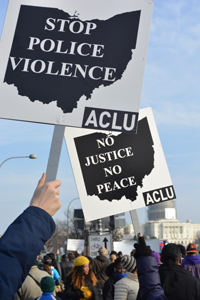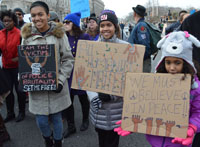News & Commentary
Seeking the Right Questions On Race and Criminal Justice Reform
Photograph courtesy of Rachel Woods You will never find a solution without asking the right questions. Last week, Columbus hosted two different gatherings intended to address tensions between communities of color and law enforcement. While part of the same conversation, both brought different people and different approaches to find solutions. At the end of the day, they raised important questions around race and criminal justice reform. Wednesday: A National Initiative On Wednesday, the first meeting of the National Initiative on Building Community Trust and Justice convened at Capital Law School. Funded by a U.S. Department of Justice grant, this program attempts to develop concrete proposals for fostering racial reconciliation, recognizing implicit bias, and advancing procedural justice. Representatives from the DOJ, criminal justice researchers, and policy experts are traveling the country to engage in dialogue with community members. The purpose and goals of the initiative offered an encouraging sign that the outrage felt across the nation has been heard at the highest levels of government. Demands from the streets, churches, and community centers across the country have secured a place on the federal agenda. The speakers expressed their optimism about the program and their desire to hear what local communities have to say. But as the third panel of experts took their places in the front of the room, it seemed that the time allotted for outside voices had been a secondary consideration. Thursday: People First On Thursday, charter buses lined up near the Ohio Statehouse as people from across Ohio came together for the People First Assembly. This event, coordinated by the Ohio Organizing Collaborative, brought together community members and local leaders to tell their stories about the criminal justice system to the offices of their state representatives.

Ohio Execution Dates
Executions Since 2009
Dates Set by the Ohio Supreme Court.
Click the year to expand and view the listings.
2016 - 11 scheduled executions

An End to Highway Robbery? Not Quite Yet
Fourth Amendment, U.S. Constitution
It’s one of the most highly praised constitutional rights in the world. In reality, however, the Fourth Amendment has been severely diluted. A good example is related to seizure of assets—cash and property like vehicles and real estate—without warrants or criminal charges.
Inequitable Justice
Until a recent cha

Ohio Same-Sex Marriage Heads to the Supreme Court!
1) Does the Fourteenth Amendment require a state to license a marriage between two people of the same sex?
2) Does the Fourteenth Amendment require a state to recognize a marriage between two people of the same sex when their marriage was lawfully licensed and performed out-of-state?
The reason why this is so important is because these questions have never been considered before in the context of gay rights. The Supreme Court recently refused to hear other gay marriage cases in October of 2014 which then, by default allowed gay marriage in many states across the country. That was a signal from the court that has some speculating that a majority of the justices will say “YES!” to both of the above questions and gay marriage will be legal in all 50 states.
Why this Matters
The inability of the freedom to marry and the lack of recognition of marria

Students Take Action!
Take action, take it to the streets
Or, to a table in your student union. Reserve a table, make some signs, and set up a laptop. Ask activists to send a quick email to a targeted elected official about your issue. If you’d like, we can help you create talking points to help in crafting the messages.
Social networking for social change
Create a Facebook page for your campus group and invite your friends, classmates, and co-workers to join. It’s a free and easy way to spread the word about your group.
Become a fan of the ACLU of Ohio on Facebook or follow the ACLU of Ohio on Twitter.
Rally for rights
A rally is a great way to get your members and others on campus excited about a particular cause. You can have food, music, games, and literature tables to attract a crowd. Decide on a theme and then partner with other campus and community groups to help with the planning and financing. You might need permits from your school, so be sure to plan well in advance.
Need help thinking of an idea? An OSU campus group, along with its partners, hosted an "Immigration Celebration" rally, complete with t-shirts, food, games, and music. They set up tables with large posters and sheets of paper for people to draw out what immigration means to them.
Tell government officials what you think
Sign up for ACLU of Ohio action alerts to stay informed about the most recent legislation affecting civil liberties. After hearing about proposed regulations that would dramatically limit women’s access to birth control, one campus group collected and faxed 400 letters to their senators urging action against the regulations.
Not sure what to say or who to say it to? Find your state legislators, U.S. senators, and U.S. representatives. Then, use these tips to help write your legislators. You can increase your impact by setting up a table in the student union or another crowded area and helping other students write their own letters. Just remember that their legislators may vary depending on where they live and register to vote.
Write a letter to the editor
Have members write a letter to the editor of the campus newspaper about a timely civil liberties topic or campus issue. Find some tips for getting your letter published here.
Host a civil liberties career panel
Many of your campus club members or classmates are probably unsure of what they want to do after graduation. Show them how they can continue to advocate after they graduate – and get paid for it – with a panel of professionals who work to protect civil liberties. Your panel could include non-profit workers, attorneys, government officials, or professors. If you'd like to include an ACLU representative, you can

Stay Informed
Sign up to be the first to hear about how to take action.
By completing this form, I agree to receive occasional emails per the terms of the ACLU’s privacy statement.
By completing this form, I agree to receive occasional emails per the terms of the ACLU’s privacy statement.



